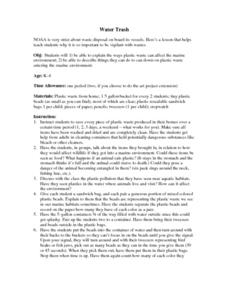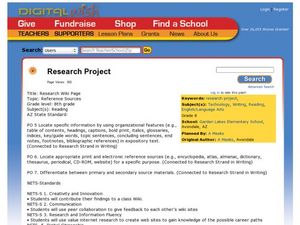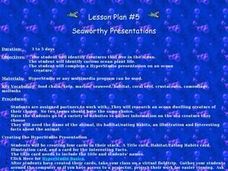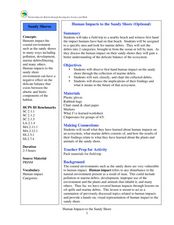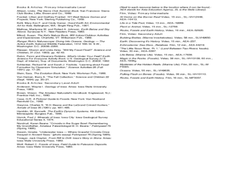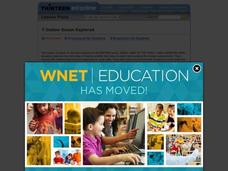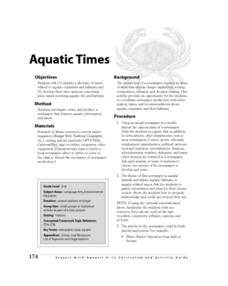Curated OER
Lesson Plan fo The Magic Eyes of Little Crab
Interested in a "how and why" story to read with young students? In this storytelling lesson, readers will discuss sea creatures, focusing on practicing new terminology through retelling the story. This resource provides a list of...
Curated OER
Artificial Reef
Pupils conduct online research to determine how and why artificial reefs are created, and investigate how they benefit marine life and the marine ecology.
Curated OER
Survival of the Fittest
Sixth graders create their own "never before seen" marine creatures and examine how not all creatures in the sea swim, not all have sharp teeth
Curated OER
Water Trash
Students examine how plastic waste affects the marine environment. They describe techniques that reduce plastic waste in this environment after examining plastic waste that accumulates in their own homes.
Curated OER
Living by the Code
Young scholars explain why new drugs are needed to treat cardiovascular disease, cancer, inflammation, and infections. They infer why some marine invertebrates are promising sources of new drugs, explaining the process in which cells...
Curated OER
Research Project
Students learn the importance of National Marine Sanctuaries and create an original illustrated research project.
Virginia Department of Education
Freshwater Food Chains
What's in the water? Encourage your class to further explore this question and learn about pond ecosystems, food chains, and food webs as they complete this hands-on activity. They view the environment from a new perspective after...
Curated OER
Seaworthy Presentations
First graders research ocean animals and plants on the web. For this ocean habitat lesson, 1st graders prepare a multimedia presentation. Students will work on their presentations in pairs and every group should have its own animals or...
Curated OER
Human Impacts to the Sandy Shore
Students investigate human impact on coastal environments. In this coastal environment lesson, students observe human impact on coastal environments. Students sort, classify, and chart marine debris collected on a local beach.
Curated OER
Hawaiian Hot Spots
Students discuss how plate tectonics and volcanic activity have affected Hawaii. In this Hawaiian lesson, students look at maps and photographs of Hawaiian Islands and discuss their formation through multiple volcanic eruptions. They...
Curated OER
A House for Me- Ocean Environments
Learners explore ocean environments. For this ocean environment lesson, students identify the things ocean animals need for survival. Learners use KWL charts and search the Internet collecting information about ocean habitats. Students...
Curated OER
Sunken Slave Ship
Learners investigate shipwrecks. In this marine archaeology lesson plan, students create the site of a shipwreck by using a tub filled with sand and items from a "ship". Learners excavate the site and analyze the findings.
Curated OER
Blue Planet: Seasonal Seas
Students study and research marine invertebrates. In this marine instructional activity students create an illustrated report and help complete a class exhibit.
Curated OER
Collect Data Using a Transect Line
Middle schoolers learn about transect lines through a study of marine debris. In this marine debris lesson, students calculate the items on a transect line and graph them. Middle schoolers complete a category worksheet.
Curated OER
Sea No Evil
Students research the characteristics of marine life at different ocean depths. They use their findings as the basis for a classroom 'Life Under the Sea' museum exhibit.
Curated OER
Kure Waste Chase Game Lesson
Students work together to identify marine debris. They explain the effect of the debris on various ecosystems. They draw different types of ocean currents as well.
Curated OER
Crinoids: Flowers f the Iowa Seas
Students study the rocks and fossils associated with the geologic landscape of Iowa. In this rocks and fossils lesson, students examine fossils that would be found in the Iowa landscape that show evidence of marine invertebrates such as...
Curated OER
Indian Ocean Explored
Students examine the rich array of marine wildlife that lives in waters surrounding the Indian subcontinent. They explore the relationships among organisms in coral reefs. They explore environmental dangers to coral reefs and research...
Curated OER
TE Lesson: Habitat Mapping
Middle schoolers examine the current technologies used in mapping resources in the marine environment. They look at remote sensing, sounding, and underwater vehicles. They examine image from the benthic habitat produced by the GIS in...
Curated OER
Edible Algae
Students acquire an awareness and appreciation for the value of the organisms in the Protist Kingdom. They identify common Protists, name them and list some common products that contain marine algae.
Curated OER
Memorandum Regarding the Enlistment of Navajo Indians
Young scholars examine the Navajo dictionary used by the U.S. military in W.W. II. They role-play Navajo messengers and Marine Corp staff. They research the Battle of Iwo Jima and confirm or discount the claim that Navajos made the...
Curated OER
Aquatic Times
Students identify a diversity of issues related to aquatic organisms and habitats and develop their own opinions concerning some issues involving aquatic life and habitats. They investigate, write and produce a newspaper that features...
Curated OER
Boston Harbor Cruise: A Shoreline Survey
The learners take a harbor cruise, photograph, and draw shore line features attending to evidence of human impact/consequences, and its cost on marine/land animal habitats vegetation, weather patterns, signs of erosion, and the water...
Curated OER
Getting Food
Students explore seashore ecosystems. In this marine animal biology activity, students sort photographs of various sea creatures according to their eating habits and discuss each animal's identifiable traits. Students draw and label...





